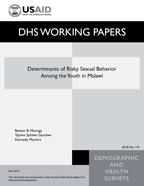- PUBLICATIONS
- JOURNAL ARTICLES
- ACCESS PUBLICATIONS
Publications Summary
- Document Type
- Working Papers
- Publication Topic(s)
- HIV/AIDS, Youth
- Country(s)
- Malawi
- Language
- English
- Recommended Citation
- Maonga, Beston B., Tapiwa Sphiwe Gondwe, and Kennedy Machira. 2018. Determinants of Risky Sexual Behavior among the Youth in Malawi. DHS Working Paper No. 141. Rockville, Maryland, USA: ICF.
- Download Citation
- RIS format / Text format / Endnote format
- Publication Date
- June 2018
- Publication ID
- WP141
Download
 Determinants of Risky Sexual Behavior Among the Youth in Malawi (PDF, 819K)
Determinants of Risky Sexual Behavior Among the Youth in Malawi (PDF, 819K)
Download this publication
There is no printed copy available to order.
